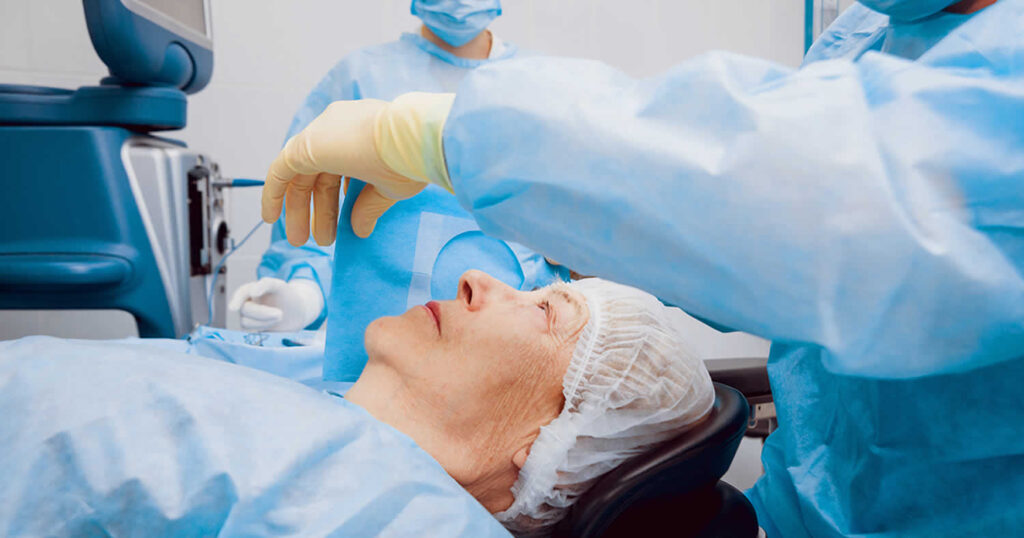Age-related alterations to our eyes are essentially unavoidable. For example, you could find that you now have trouble with glare, especially from headlights while driving at night, or that you require reading glasses to read a restaurant menu.
Cataracts, which more than half of Australians will have by the time they are 80 years old, often cause the latter issue. One of the research by personaleyes.com.au/cataracts shows when the lens, an eye component that concentrates light onto the retina to create a clear vision, begins to get clouded, a cataract develops.
According to Yale Medicine ophthalmologist Yvonne Wang, MD, a typical lens should be transparent, like to a windshield. “Your lens’ proteins begin to deteriorate when a cataract forms. The lens can no longer sustain that clarity when they alter in consistency.
See Also: Managing and preventing vitreous loss after cataracts surgery
A modification in the prescription for your glasses or contact lenses may be sufficient to assist when cataracts are initially developing. But since cataracts become worse with age, a lot of individuals end up having surgery to remove their current “cloudy” lens and replace it with a new artificial one. Thankfully, cataracts surgery is a routine and safe process.
Numerous improvements in cataracts surgery have also been made recently, including a laser-assisted procedure and a device called intraoperative aberrometry (ORA), which measures the eye further while the patient is under anesthesia. This makes it possible to measure the artificial lens used to replace the natural lens in cataracts surgery more precisely.

The options for lenses are also fast developing; they now go beyond just changing the lens. Some patients may no longer need glasses or contacts after cataracts surgery thanks to options like multifocal lenses, which not only repair the cataracts condition but also address vision issues.
Despite the fact that cataracts surgery is mostly safe, it can have certain risks. These may consist of:
Ocular cloudiness after cataracts surgery
A hazy layer known as posterior capsule opacification might develop behind your implant in 5 to 50% of instances. A YAG laser capsulotomy, an office-based procedure, may cure it in around 5 minutes.
Eyesight blurriness after cataracts surgery
Blurriness is typical in the days after cataracts surgery. Though sometimes it may take longer, it normally goes away in a few days.
Post-cataracts surgery floating
Floaters have the appearance of moving bits of dust. Floaters may not always need any special care, although they may indicate a retinal tear.
After cataracts surgery, dry eyes
After your operation, dry or gritty eyes are a frequent symptom. Eye drops are often used to treat this.
After cataracts surgery, eye discomfort
Serious discomfort might be an indication of an infection or other issues. To get the finest care, get in touch with your surgeon.
Following cataracts surgery, there is double vision
Double vision may be caused by a variety of things, but it often happens when your brain adjusts to your improved eyesight. Most likely, it will disappear in a few days.
Infection
Endophthalmitis is an infection of the fluids in your inner eye. Trusted Source It is estimated that 0.05 to 0.30 percent of cataracts operations will result in it.
Anaesthesia sensitivity
An allergic response is always a possibility after receiving anaesthesia. There are hardly many severe responses.
Cost of cataracts surgery
In the event that your operation is declared medically essential, insurance may pay for the costs. Location and operative method affect how much cataracts surgery costs.
The American Academy of Ophthalmology estimated in 2014 that out-of-pocket costs for this treatment might total about $2,500 when accounting for anesthesiologist, hospital, and surgeon expenses. This can imply that the price has increased. You can speak with local ophthalmologists to get a more precise figure.
Does Medicare pay for a cataract operation?
If cataracts surgery is performed using lasers or conventional surgical methods, Medicare will reimburse the expense.
A pair of corrective lenses or contacts that are required after surgery are covered to an extent of 80% by Medicare part B.

The prognosis and recovery after cataracts surgery
According to the National Eye Institute, cataracts surgery improves vision in roughly 90% of patients. The operation is thought to be secure and has the ability to restore the clarity of your vision that it had before the cataracts.
A second operation is necessary to address posterior capsule opacification, which occurs in 5 to 50% of patientsTrusted Source.
How long can cataracts surgery be put off?
Cataracts often grow slowly and are not seen as a medical emergency. The length of time you may safely put off having surgery depends on how quickly your cataracts are developing.
Although it’s normally better to get the operation as soon as possible, you should see a doctor to find out how long you may wait safely.
Cataracts will continue to worsen if ignored and might eventually cause total blindness.
It’s critical to identify and treat congenital cataracts in youngsters as soon as possible.
Takeaway
One of the most frequent and safest surgical procedures carried out in the US is cataracts surgery. The treatment takes just a few minutes and doesn’t need an overnight hospital stay. The cost is covered by Medicare and several insurance companies.
Ask your doctor whether you are a suitable candidate for surgery if you have cataracts that are impairing your eyesight.
Final thoughts
Cataracts surgery is one of the procedures that is done often. Over twenty million people throughout the world and over four million people in Australia get cataract surgery each year. These procedures are considered some of the safest that modern medicine has to offer.
They have made it possible for millions of individuals to regain a higher quality of life via improvements in their vision. The cataracts experts at our eye clinic strive, in each and every clinical environment, to give our patients with the very best possible results.
When cataracts are first forming, a change in the prescription for your glasses or contact lenses may be enough to help. However, since cataracts worsen with aging, many people eventually need surgery to remove their present “cloudy” lens and replace it with a new artificial lens. Fortunately, cataracts surgery is a common and secure procedure.
